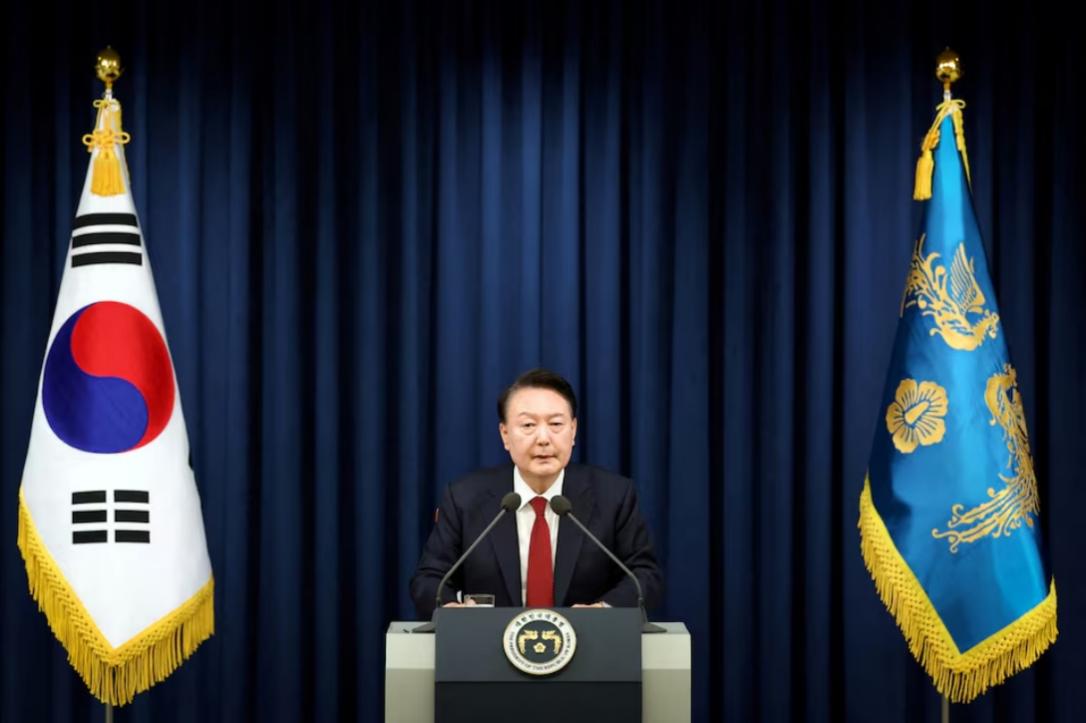
South Korean President Yoon Seok-yoon's sudden declaration of martial law has destabilized the country's political situation and further challenged an already shaky economy. The decision plunged the National Assembly into an unprecedented crisis, while South Korea's financial markets suffered wild swings, particularly in the corporate stock market and the won's exchange rate.
First, the iShares MSCI index, which tracks more than 90 large and medium-sized companies in South Korea, plunged as much as 7 per cent after Mr Yoon declared martial law. At the same time, the Korean won also fell to its lowest level against the dollar since 2022, and market sentiment is very gloomy. However, since the lifting of martial law, the won has gradually recovered. The central bank also announced it would increase short-term liquidity in an effort to calm market jitters and ensure economic stability. Still, investors' reaction to a sudden bout of political turmoil in an advanced economy such as South Korea remains fraught, with analysts warning that the uncertainty could have a profound impact not just on its own market but on the global economy.
Second, Seoul's stock market has been plagued by a phenomenon known as the "Korea discount," which means that South Korean shares are often valued at a discount to the value of the assets held by their companies. According to a Reuters analysis, investors are wary of South Korea's strained relations with North Korea, as well as an economic structure that is overly dependent on the Chinese market. Mr. Yoon campaigned on a promise to eliminate the discount, but his political move has plunged South Korea into political turmoil once again, undermining international investor confidence and threatening to undo the country's longstanding efforts to attract foreign investment. As Nikkei's Asia business correspondent points out, this has made Korean stocks less of a favorite investment for global fund managers, and the future outlook more difficult to predict.
Moreover, Yoon's declaration of martial law also comes at a time when the export-oriented model of the South Korean economy is facing considerable challenges. Economists at Natixis say a strong government that can balance the budget and deal with external threats is crucial for South Korea's export-oriented economy. Especially in the context of the complex global economic situation, how to deal with the tariff policy of US President Trump after taking office, how to deal with the malaise of the global auto industry, these need a strong government to make effective decisions. However, Yoon may face impeachment, which makes the political situation in South Korea more uncertain, the opposition may take the opportunity to consolidate their own power, and further intensify the political game.
However, economists at Bloomberg point out that Yoon's impeachment could trigger more expansionary fiscal policies that could spur growth in the South Korean economy. Such a situation could also lead South Korea to fall back into the trap of over-reliance on specific economic policies. At the same time, Japan's "Mainichi" warned that Yin Xiyue's resignation may reignite the trade dispute with Japan and end the recent "honeymoon period" between the two countries, which will undoubtedly have a small impact on the economic relations between the two countries.
Finally, the Yoon administration's martial law has exposed South Korea's vulnerability to internal and external pressures. The incident not only tested South Korea's political system, but also profoundly affected global investor confidence in the country. For an economy dependent on open markets and globalization, the rule of law and the stability of democratic institutions are essential because they provide an environment that guarantees innovation and free competition. The Korean economy has made considerable achievements in the past few years, but how the current political situation will evolve remains an open question. As global economic uncertainties intensify, how South Korea can promote economic development while maintaining political stability will be the biggest challenge for some time to come.
To sum up, through this incident, it can be seen that as a developed country, South Korea's democratic system and the rule of law system are still facing a huge test. Investor confidence often depends on political stability and transparency, which in turn determines whether national economies can compete globally. For South Korea, restoring domestic political stability, strengthening the rule of law, and improving economic structure remain the top priorities for future development.

On January 7th local time, GameStop (GME.US) announced that the company's board of directors had approved a potential executive compensation package worth $3.54 billion, which was targeted at the company's CEO, Ryan Cohen. At the same time, this new compensation package set extremely high performance thresholds: Cohen, the CEO, needed to increase the company's market capitalization from $9.5 billion to $100 billion.
On January 7th local time, GameStop (GME.US) announced that…
According to the British media The Guardian, recently US Pr…
In today's era of deep integration of globalization and dig…
In early 2026, US President Trump forcibly took control of …
Recently, the corn market dynamics analysis released by Aus…
Donald Trump has proposed an "immediate" restriction on lar…